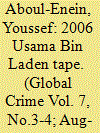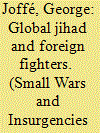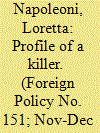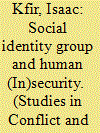| Srl | Item |
| 1 |
ID:
077338


|
|
|
|
|
| Publication |
2006.
|
| Summary/Abstract |
Editor's Note: This essay is an excellent example of why we should be reading and analyzing the public messages of our opponents. Too often we dismiss the statements of Bin Laden and other criminal-soldiers as pure rhetoric and propaganda. In our struggle against Al-Qaeda and other criminal-state entities it is imperative that we know and understand the leadership of 'thine enemy' in order to disrupt, dismantle, and ultimately defeat them.
This essay discusses the rationale behind Usama Bin Laden's January 2006 tape, released by the Al-Qaeda leader after a 13 month hiatus. The essay puts forward theories behind the timing of the release of the tape and highlights Bin Laden's changes in strategic thought in response to changes in the political landscape of the Middle East. Bin Laden has also been carefully monitoring the anti-war movement and, for the first time, urges Americans to read an American author as a means of understanding his geo-political desires for the Muslim world. Readers will also be able to place Bin Laden's January 2006 tape in the context of recent statements by Ayman Al-Zawhairi and Abu Musab Al-Zarqawi
|
|
|
|
|
|
|
|
|
|
|
|
|
|
|
|
| 2 |
ID:
147715


|
|
|
|
|
| Summary/Abstract |
One question that has been unresolved since the current phase of extremism began in the early- to mid-1990s has been whether or not there is a global structure to the jihadi phenomenon. This paper argues that no such definable structure exists, although regional, national, and local networks may well share common objectives and ideological ambitions. There has, in short, been a process of global branding that has developed that, in structural terms, corresponds to a ‘network of networks’. These objectives and the related praxis, moreover, have evolved over the years, going through three distinct stages of development, encapsulated in the strategic distinctions between al-Qa’ida, Ansar al-Shar’ia, and the Islamic State (Da’ish). Allied to this is a second consideration; namely that the formal ideological inspiration and justification for extremist activities is a set of integrated common insights that form a coherent ideology derived from a literalist interpretation of Islam, Salafism. A further aspect of the Salafi–jihadi phenomenon is to what degree this formal ideology is the real explanation of the appeal of these movements to their adherents, particularly to the so-called ‘foreign fighters’ – those who volunteer from countries not directly implicated in the specific conflicts in which they participate. This paper will argue that the phenomenon is far more complex than the superficial appeal of jihadist ideology would suggest. Finally, the paper will attempt to sketch out what the underlying causes of the intense wave of extremism sweeping the Middle East and North Africa might be and to what extent ‘blow-back’ from returning jihadis should be of concern to home governments.
|
|
|
|
|
|
|
|
|
|
|
|
|
|
|
|
| 3 |
ID:
066172


|
|
|
| 4 |
ID:
137792


|
|
|
|
|
| Summary/Abstract |
The article uses social identity group theory and human insecurity to examine the rise of the Islamic State in Iraq and the Levant (ISIL). After first defining social group identity and its characteristics, the article reviews the Al Qaeda ideology that serves as the foundation of ISIL, before turning attention to the message and legacy of Abu Musab al-Zarqawi and their profound influence on ISIL. The article concludes by arguing that only by ending the marketplace of identities can stability be restored to Iraq and Syria.
|
|
|
|
|
|
|
|
|
|
|
|
|
|
|
|